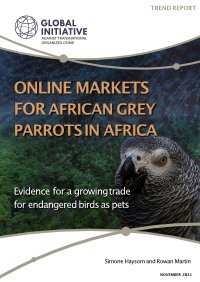By Josef Job G. Raymundo, Emerson Y. Sy, and Serene C.L. Chng
The Philippines has a rich hornbill diversity, but many species are found in a restricted range and threatened by habitat loss, hunting for wild meat and cultural objects, and the live bird trade.
This threat is reinforced by the discovery of 143 live hornbills from nine taxa for sale online from 2018-2022, reported in Farmers of the Forest in Cages: The Online Trade of Hornbills in the Philippines.
While the Luzon Tarictic Hornbill was the most recorded species in the study (73% of all individuals), five Endangered Visayas Tarictic Hornbill Penelopides panini were also offered for sale.
Two-thirds of traders recorded were in central Luzon and likely sourced wild hornbills within or from nearby provinces, said the report authors.
Seizure records during the same period showed a further 66 hornbills seized in 24 incidents.
TRAFFIC, Southeast Asia Regional Office, Petaling Jaya, Selangor, Malaysia, 2023. 24p.











